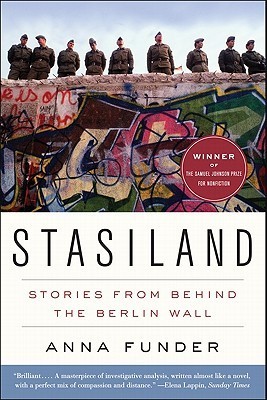More on this book
Community
Kindle Notes & Highlights
by
Anna Funder
Read between
January 14 - January 17, 2024
The romance comes from the dream of a
better world the German Communists wanted to build out of the ashes of their Nazi past: from each according to his abilities, to each according to his needs. The horror comes from what they did in its name. East Germany has disappeared, but its remains are still at the site.
Leipzig was the start and the heart of it.
they were backward and they were broke, and the whole Stasi thing…’ He trailed off. His breath was minty. ‘It’s sort of…embarrassing.’
training as a journalist was effectively training as a government spokesperson.
The only mass medium the government couldn’t control was the signal from western television stations,
Relations between people were conditioned by the fact that one or other of you could be one of them. Everyone suspected everyone else, and the mistrust this bred was the foundation of social existence.
In the GDR, sport was closely linked with politics. The government screened youngsters for their potential and fed them into training institutes for the glory of the nation.
What surprises me about living here is that, no matter how much is taken out, this linoleum palace continues to contain all the necessities for life, at the same time as it refuses to admit a single thing, either accidentally or arranged, of beauty or joy. In this, I think, it is much like East Germany itself.
Mielke’s apparatus, directed largely against his own countrymen, was one and a half times as big as the GDR regular army.
In the GDR, there was one Stasi officer or informant for every sixty-three people.
Without it, and without the threat of Soviet tanks to back it up, the SED regime could not have survived.
By comparison with other Eastern Bloc countries, East Germany never had much of a culture of opposition. Perhaps this was in part due to the better standard of living, perhaps to the thoroughness of the Stasi—or, as some put it, to the willingness of Germans to subject themselves to authority. But mostly it was because, alone of all Eastern Bloc countries, East Germany had somewhere to dump people who spoke out: West Germany. It imprisoned them and then sold them to the west for hard currency.


